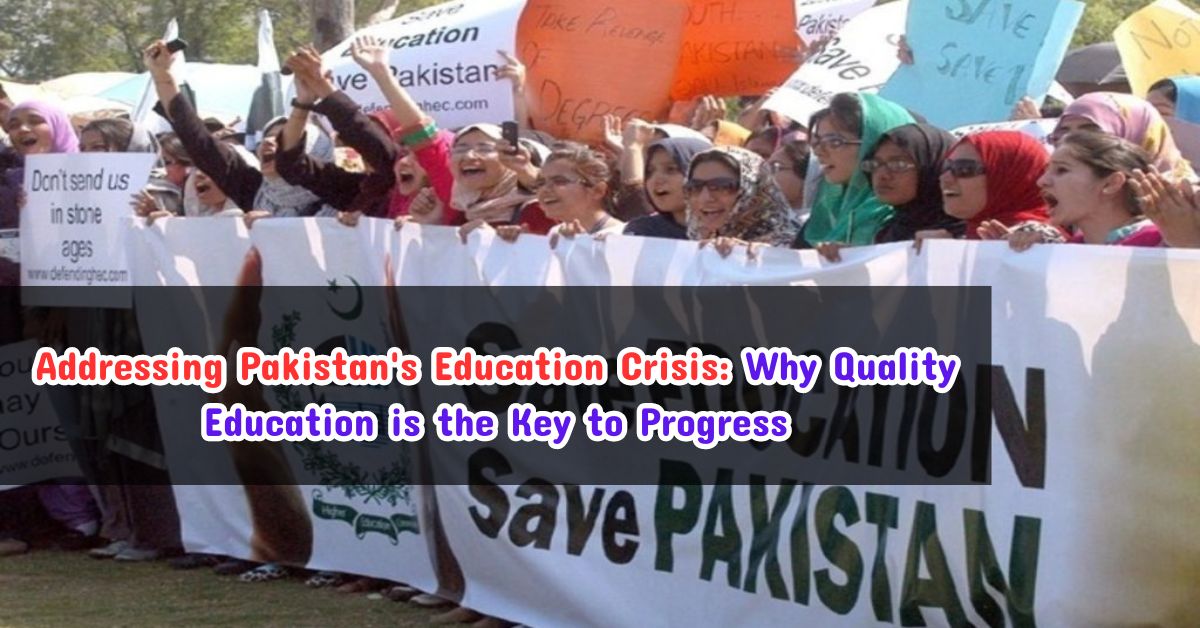Pakistan is in the grip of a severe educational crisis. Despite numerous initiatives and substantial funding, millions of children remain out of school, and the quality of education for those who do attend is often lacking. Recently, the Education Task Force convened to discuss this issue, acknowledging the persistent crisis and urging increased funding. Yet, the question remains: Is funding alone the solution, or does the focus need to shift towards improving the quality of education?
This article explores why quality education should be prioritized over mere enrollment numbers and how it can be the cornerstone of tackling broader societal issues such as poverty, unemployment, and inflation.
Also Read: Discover Proven Learning Techniques to Enhance Skill Acquisition for Lifelong Success
The Current Educational Landscape in Pakistan
Pakistan faces an alarming situation, with an estimated 25 million children out of school. This statistic highlights not only a lack of access to education but also reveals the barriers created by poverty, gender inequality, and insufficient educational infrastructure. The government recently announced plans to invest Rs75 billion in an effort to bring these children back to school. However, merely enrolling students without addressing the underlying issue of educational quality may not provide the long-term benefits needed for societal progress.
Also Read: Islamabad, Rawalpindi to Observe Three-Day Public Holiday for SCO Summit: What You Need to Know
Out-of-School Children: A Persistent Challenge
Out-of-school children are a symptom of a much larger problem. For many families, school is often not a priority due to financial constraints or a perception that education does not offer a significant return on investment. Addressing these challenges requires a multifaceted approach, where funding is directed not just towards enrollment but towards enhancing the quality of education provided.
Quality Education: A Solution to Pakistan’s Societal Issues
Quality education goes beyond basic literacy and numeracy. It involves developing critical thinking skills, fostering creativity, and equipping students with the knowledge and competencies they need to thrive in a rapidly evolving world. In Pakistan, an increased focus on quality education could be the key to unlocking significant societal progress.
- Reducing Poverty
Quality education is one of the most powerful tools for breaking the cycle of poverty. Educated individuals are more likely to secure stable, higher-paying jobs, contributing to their families and communities. By investing in education that builds practical skills and prepares students for the workforce, Pakistan can empower its youth to lift themselves out of poverty. - Addressing Unemployment
Pakistan has a young population, but many young people face unemployment due to a lack of skills. A quality education system that includes vocational training, technical education, and career guidance can help bridge this gap. This, in turn, can reduce the unemployment rate and create a more dynamic economy driven by skilled labor. - Combating Inflation
An educated populace can contribute to economic stability, innovation, and growth. Quality education encourages critical thinking and problem-solving, which are essential for building a resilient economy. By investing in quality education, Pakistan can cultivate a generation of leaders, entrepreneurs, and innovators capable of addressing inflation and contributing to economic progress.
Key Areas for Improvement in Pakistan’s Education System
To move towards quality education, Pakistan needs to address specific areas that are currently under-resourced and underdeveloped:
- Teacher Training
Teachers are the backbone of any education system. Investing in teacher training ensures that educators are equipped with the skills and knowledge to deliver high-quality instruction. This includes training in modern teaching methods, inclusive education practices, and continuous professional development. - Curriculum Development
A well-designed curriculum that is relevant to the local context and aligned with global standards is essential. Curriculum reforms should focus on critical thinking, problem-solving, and digital literacy to prepare students for future challenges. - Educational Infrastructure
Many schools in Pakistan lack basic facilities such as clean drinking water, sanitation, and electricity. Upgrading school infrastructure and providing a safe, conducive learning environment are fundamental to achieving quality education. - Digital Education and Technology Integration
In the digital age, incorporating technology into education is no longer optional. By investing in digital resources and online learning platforms, Pakistan can expand access to quality education, especially in rural areas.
Also Read: 5 Unexpected Ways Your College Dorm Can Boost Your Mental Health
Conclusion: Investing in a Brighter Future
Quality education has the potential to transform Pakistan. It is not just about getting children into classrooms but ensuring that those classrooms foster a love of learning, critical thinking, and a sense of responsibility towards society. By shifting the focus of educational investment from quantity to quality, Pakistan can address its current challenges and pave the way for a more prosperous and equitable future.
For Pakistan to succeed, it is essential that both the government and the educated class take proactive steps towards this goal. Prioritizing quality education can lay the foundation for a more resilient economy, a reduction in poverty, and an empowered generation ready to shape the future.
Also Read: NUST Confers Honorary PhD Degree upon Malaysia’s Prime Minister Anwar Ibrahim
Encourage Social Sharing: If you believe in the power of quality education to drive societal change, share this article with your network. Together, we can raise awareness and advocate for a brighter future for Pakistan.
